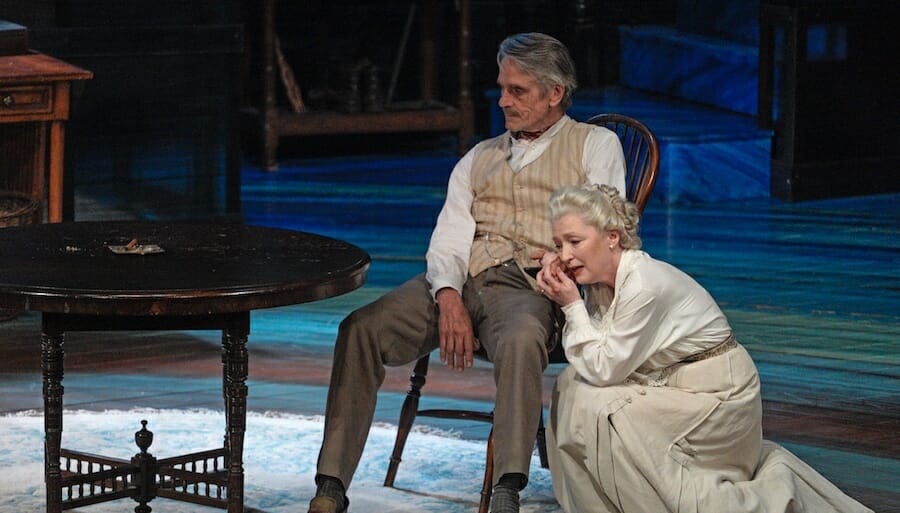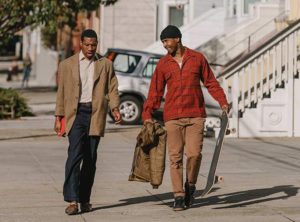Top-Flight Cast Takes On American Classic ‘Long Day’s Journey Into Night’
The Beverly Hills production features Jeremy Irons and Lesley Manville under the direction of five-time Olivier Award winner Richard Eyre. Jeremy Irons and Lesley Manville appear onstage as James and Mary Tyrone in director Richard Eyre's production of "Long Day's Journey Into Night" in Beverly Hills, Calif. (The Wallis Annenberg Center for the Performing Arts)
Jeremy Irons and Lesley Manville appear onstage as James and Mary Tyrone in director Richard Eyre's production of "Long Day's Journey Into Night" in Beverly Hills, Calif. (The Wallis Annenberg Center for the Performing Arts)
While working on Almeida Theatre’s Olivier Award-winning revival of the Henrik Ibsen classic “Ghosts” in London’s West End, director Richard Eyre turned to Lesley Manville, his leading lady and longtime friend, and suggested they next take on Eugene O’Neill’s autobiographical drama, “Long Day’s Journey Into Night.”
“Of course I knew that this epic, huge, complex and delicate play needed to be in hands that I could trust implicitly,” Manville, an Oscar nominee for last year’s “Phantom Thread,” said in an interview with Truthdig. “Because of our history with ‘Ghosts,’ that was all in place for me. We worked brilliantly together, and certainly both of these plays have been the historical highlights of my career.”
Written in 1941, “Long Day’s Journey Into Night” looks back at a slice of time following the author’s stint on the high seas, before he began writing plays. Oscar-winner Jeremy Irons plays James Tyrone, a once-promising actor-turned-alcoholic who squandered his talent for money. That character is similar to O’Neill’s own father, an alcoholic itinerant actor.
Jamie (Rory Keenan), is Tyrone’s oldest son, an acting aspirant and, like O’Neill’s real-life brother of the same name, also alcoholic. The youngest, Edmund (Matthew Beard), a poet with tuberculosis, is based on O’Neill. Like Edmund, O’Neill was indirectly responsible for his mother Mary Tyrone’s addiction to morphine, which she began abusing after suffering complications during childbirth.
Produced in 1956, “Long Day’s Journey Into Night” won O’Neill his fourth Pulitzer Prize three years after his death. Here, Irons, Eyre and Manville discuss their critically acclaimed production, currently running at the Wallis Annenberg Center for the Performing Arts in Beverly Hills, Calif., through July 1.
Jordan Riefe: What’s key to building a strong relationship with a director?
Lesley Manville: You’ve got to combine our mutual gifts, him as a director and me as an actress. But he’s very open, he’s hugely clever and he has a great intellectual understanding, and on top of that he has a very human understanding. When you’re doing plays like “Ghosts” and “Long Day’s Journey,” you need somebody who isn’t afraid of being in touch with and posing their vulnerabilities and their tenderness and their understanding of sometimes how hard it is for the character you’re playing to be a proper human being.
Richard Eyre: In the theater, what you enjoy is the interaction with the other actors and the interaction with the audience. That’s why I think Jeremy and Lesley are theater animals. They breathe and thrive on that kind of live experience—being present tense with an audience.
JR: Talk to me about rehearsing such a prolix piece. It seems it would be exhausting.
Jeremy Irons: To a certain extent, Tyrone reacts around Mary’s addiction. So you have to wait until she’s found how she’s going to play to see what you’re going to react to. So the first rehearsals were quite unnerving, because you think, “I’m not getting anything, I’m not doing anything.” But once her performance was solidified, I was able to sort the play around it. I know Olivier had a lot of trouble when he was doing it.
LM: I kind of hit the ground running. I’m a very instinctive actor, and I learned the lines completely before we started rehearsing when we did it in Bristol in 2016, because I knew the rehearsal time we had would have to be spent working out how to play her and make the scenes work rather than be struggling over the lines. So I think I started to deliver for all the other actors rather quickly. I didn’t leave them hanging around to see what my take was going to be.
JR: What did you learn about addicts in preparation for the role?
LM: Practical things, like if you’re injecting morphine into a fleshy part of your body, it probably takes 10 to 15 minutes to hit. But sometimes in the play, she goes upstairs and she comes back down a few minutes later and she’s like a different person. And this doctor says, ‘Yes, if you go into [the] vein, the effect is pretty instant, really.’ As luck would have it, people who are morphine addicts, their behavior is very volatile.
JR: Jeremy, Tyrone is accused of being a skinflint, but don’t all actors, regardless of their level of success, worry that the phone will never ring again?
JI: When I was starting off in my career, before it began to get a rhythm to it and I was lucky enough to create a financial cushion, I was very careful. I remember my first wife—it only lasted a couple of years; I was 21—but I was forever saving. And I remember when we were separated she said it was such a relief not to have to save. I can go out and spend!
JR: How important is a play like this to maintaining your craft?
JI: I’ve tried to make sure that those high-paying jobs subsidize the work I really value, which does not pay too much, and I’ve been pretty lucky. Maybe if I’d stayed and done more great Shakespearean roles—I’d done a few—I would be in a position like Ian McKellen, who has done them all. But then, of course he was very, very happy to go off and do the Tolkien series and be tied up for a long time.
JR: The critics were kinder in the U.K. than they were in Brooklyn.
JI: I think when you’re dealing with a classic, the critics will often, sadly, compare it with what they’ve seen before, and their memories of the play and what it did for them.
LM: We’ve had amazing notices in Bristol and London, and we had some reservations in America, but that’s their prerogative, and maybe there’s an element of them being much more critical because it’s English doing an American play.
JR: The knock is that it’s played too fast.
JI: Yes, we do play it quite fast. Because we play the first scene really quite fast, with lots of overlapping, sort of how a family behaves amongst themselves, they cut in on each other to give some variance, they (the critics) have to listen and they have to work a little bit at the start. But maybe for some critics, this was too much.
JR: Ms. Manville has said it’s the greatest writing she’s ever performed.
RE: I’ve done an awful lot of classics, a lot of Shakespeare, I’ve done Arthur Miller, I’ve done Tennessee Williams and Sean O’Casey. This is pretty high. I think it’s a great play, a formidably great play. I don’t take it for granted in any way. It still seems to be an extraordinary honor to be doing this play in New York and Los Angeles. It’s a thrill.
Your support is crucial…With an uncertain future and a new administration casting doubt on press freedoms, the danger is clear: The truth is at risk.
Now is the time to give. Your tax-deductible support allows us to dig deeper, delivering fearless investigative reporting and analysis that exposes what’s really happening — without compromise.
Stand with our courageous journalists. Donate today to protect a free press, uphold democracy and unearth untold stories.






You need to be a supporter to comment.
There are currently no responses to this article.
Be the first to respond.